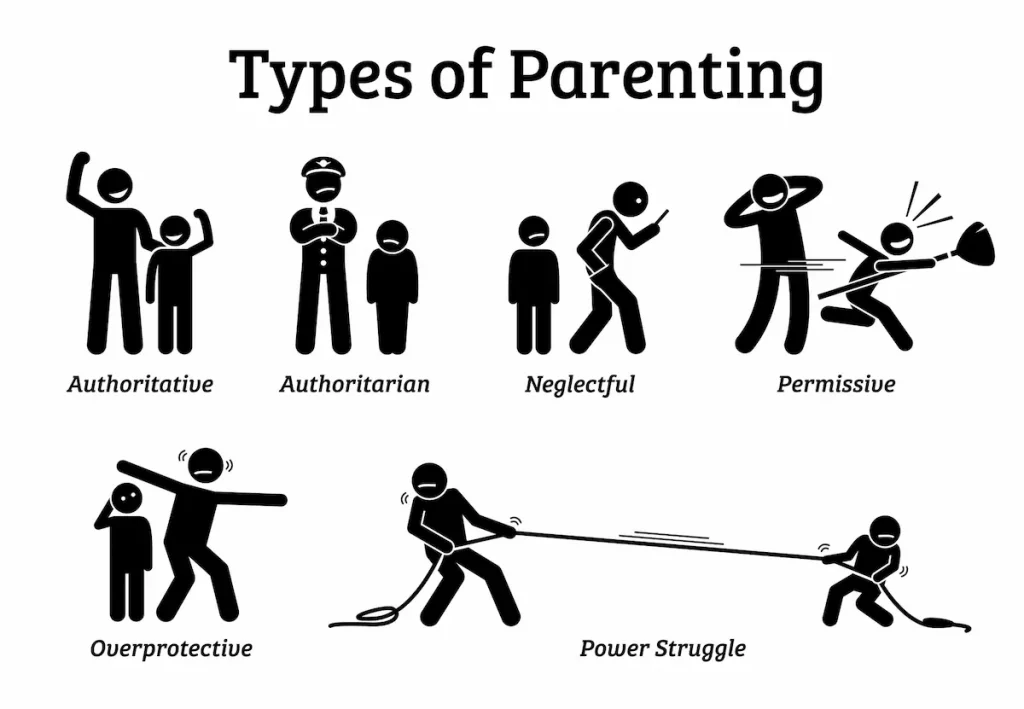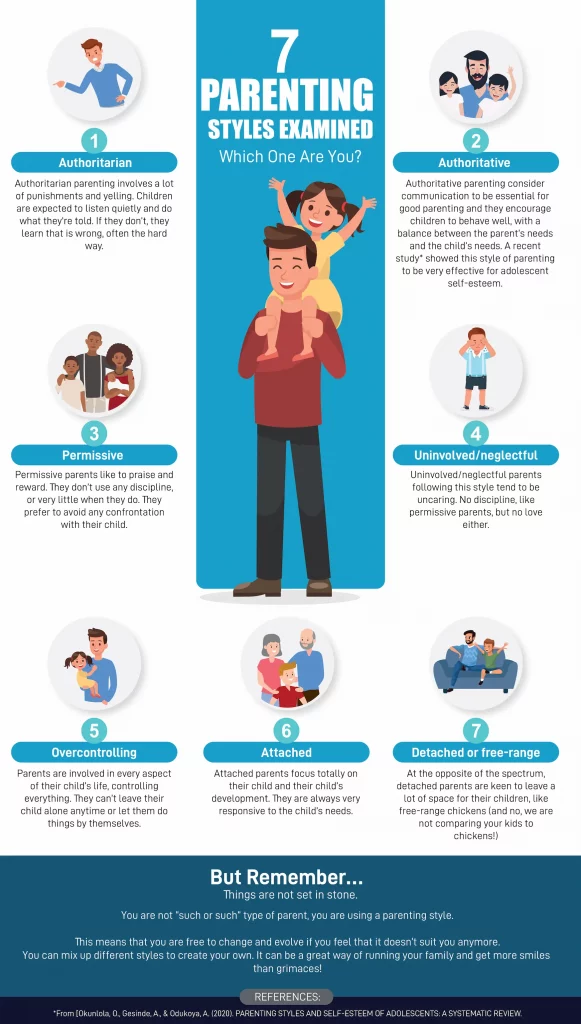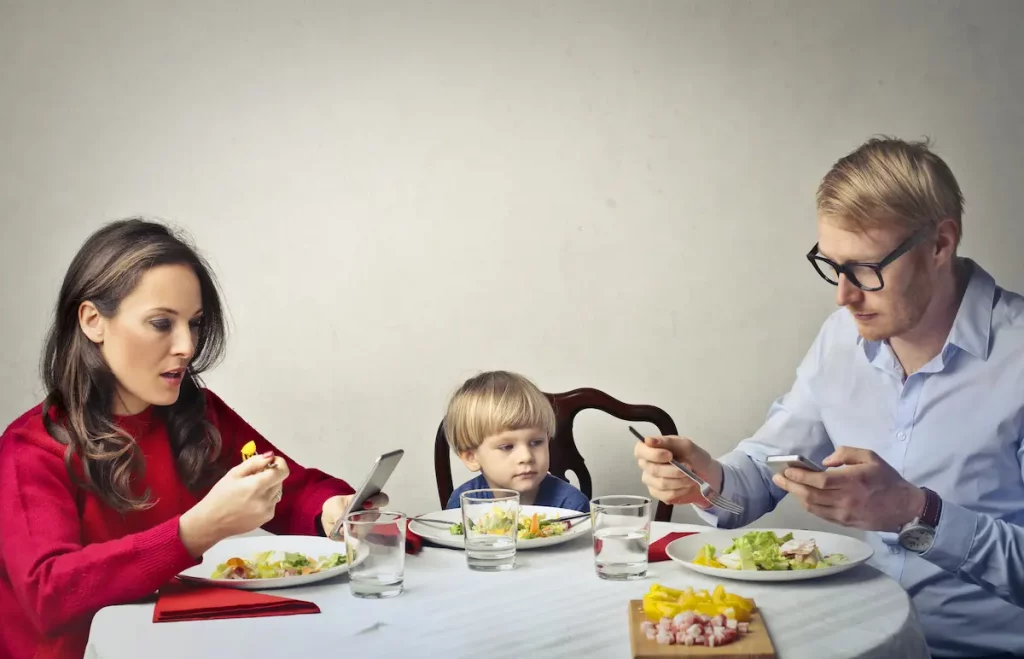Becoming a parent is quite an adventure. The kind of trip you cannot be truly prepared for.
After dealing with milk bottles, diapers, and short and interrupted nights, you start to see your child growing and developing a personality, expressing demands and responding to what you say or do (and not always the way you like!).
You go from providing care to providing education. You become a parent.
This can be challenging.
We become parents by trying, making mistakes, and having sweet wins (such as that beautiful and heartwarming smile the other day!). There is no manual to follow, you will have to improvise a lot.
But you want to do your best for your child and you start to worry about what parenting style is the best. Or maybe your child is already older but you want to revise your method.

Related Reading: Parent Meaning and Definition [DISCUSSED]
Psychologists have been studying for decades and they identified several ways of being a parent.
The most famous theory, published by the developmental psychologist Diana Baumrind in 1967 defines the 4 following parenting styles (click each one for a summary):
- Authoritarian
- Authoritative
- Permissive
- Uninvolved/neglectful
Authoritarian parenting involves a lot of punishments and yelling. Children are expected to listen quietly and do what they’re told. If they don’t, they learn that is wrong, often the hard way.
Authoritative parenting encourages children to behave well, with a balance between their exigence and Liam’s needs and wants. Authoritative parents show affection and support, and consider communication to be essential for good parenting.
Permissive parents like Leila’s mum and dad like to praise and reward. They don’t use any discipline or very little. They prefer to avoid completely any confrontation with their child.
Uninvolved/neglectful parents following this style tend to be uncaring. No discipline as for permissive parents, but no love either.
But I will touch on other ways of playing your role as a parent: the overcontrolling style, the attached, and the detached.
There is no right or wrong answer and there is still a commonality between them.
Creating a healthy relationship with your child is all about understanding her personality and what she needs. Do not put yourself and her into boxes!
Here is a little message you may need to hear: if you are reading this, it means that you care and this is all that a child needs in the end: parents who care (and pizzas every Friday night of course!).
You are already doing great!
Before we start exploring further the different ways of being a parent, I need to give a disclaimer.
What I explain about the different styles and the effect on children are guiding lines.
There are lots of nuances depending on many factors and no direct causality between your way of parenting and how your child will grow.
Now that that is out of the way, let’s dive right into the different parenting styles and their effect on your child.

Authoritarian Parenting
Julie refused to put her plate into the sink after dinner and ran to play. It didn’t take more than a few seconds before she heard her father yell at her and get her mother to send her to the corner for a timeout.
Julie’s parents are using authoritarian parenting.
Julie understands that she is not allowed to express her emotions and that she has to follow strictly the rules to make her parent happy. She becomes obedient, but she doesn’t know how to decide for herself.
As an adult, she may not know what she really wants. She focuses more on being “nice” and live as others expect her to live than thriving by doing what she loves.
Parents using this style are very demanding, directive. They mostly want their child to obey and don’t listen much to her needs.
This way of parenting involves a lot of punishments and yelling. Children are expected to listen quietly and do what they’re told. If they don’t, they learn that is wrong, often the hard way.
If you are using an authoritarian style of parenting, you believe that:
- Children don’t need to be heard.
- They need to follow the rule, no discussion.
- Their feelings don’t matter and you don’t want to spend time discussing them. “It is like that, whether you like it or not.”
Pros
- Well structured environment
- Clear expectations and boundaries
Cons
- Children can feel insecure
- They have poor self-esteem
- They show a lack of social skills
- They are more subject to depression and other mental issues
- They perform worse at school
- They are more likely to have drug issues
Authoritative Parenting
Liam is used to playing freely. But he also knows that he has duties. He is used to following rules, but he doesn’t try so much to infringe them because his parents took a lot of time to explain them to him. When it happens, they start listening to him and then explain again the rules and why they are set.
Liam’s parents are authoritative. They encourage him to behave well, with a balance between their exigence and Liam’s needs and wants. They show affection and support and consider that communication is essential for good parenting.
Liam knows that his parents will be there for him when things become difficult. This gives him confidence in exploring new horizons and finding his own interests. Liam feels always guided and loved.
He is not afraid to show his emotions and talk about them since his parents have been showing theirs and spend hours listening and talking to him openly.
Liam understands the need for rules when they are justified and doesn’t feel the need to defy authority if it is legitimate.
If you are using an authoritative style of parenting, you believe that:
- Children have to listen and obey
- Communication is essential to help them understand the rules
- Children can participate in establishing the rules (to some extend!).
Pros
- Children have usually higher self-esteem compared to other parenting styles
- They are more self-confident
- They are less prone to addictions or deviant behaviors such as violence.
Cons
It is more challenging for the parents! This way of parenting requires a lot of energy and adaptability.
Related Reading: Scaffold Parenting Examples & How It Works
Permissive Parenting
Leila enjoys full freedom. She gets everything she wants from her parents, toys, ice creams. If she doesn’t want to go to bed at night, her parents will let her play, sing or dance. Even if she has school the following day. She never hears the word “No” at home. She is in control.
Leila grows up without any boundaries. She thinks that she is always in her own right.
She doesn’t know how to control her emotions or deal with others’. She can bear losing since she is used to getting everything she wants. She doesn’t know when and where to stop and goes over the limits often.
Permissive parents like Leila’s mum and dad like to praise and reward. They don’t use any discipline or very little. They prefer to avoid completely any confrontation with their child.
If you are using a permissive style of parenting, you believe that:
- Children have all the rights
- Rules and chores are for adults only
- Punishing or setting boundaries means a lack of love for your children
Pros
Children feel loved and have access to many possibilities.
Cons
- They get more often into trouble
- They feel more stressed
- They tend to be more bullied since they don’t know how to deal with conflicts
- They are more prone to health issues or addictions such as drinking
- They tend to struggle with social interactions.
Uninvolved/neglectful Parenting
Ryan feels alone. Completely alone. He can do what he wants, and experience lots of things. But nothing seems to matter since he never hears anything from his parents. He doesn’t get any attention or comments, not even a hug. He doesn’t feel loved.
Ryan feels deeply that no matter what he does, nobody will care.
He lacks trust in himself and others. He can’t develop healthy relationships, is too insecure and negative about himself. He even tries to block away from any feeling, not to feel the pain of not being worthy of any love.

If you identify with a neglectful style, you are probably not reading this. But if you do (or if you know one), you will believe that:
- It doesn’t matter what your child does
- You don’t have to answer his needs (besides the vital ones)
- You don’t have to feel or show any affection
- Being a parent is a burden, a curse, nothing else.
Those parents have often mental or physical issues, with a history of child abuse or neglect.
Parents following this style tend to be uncaring. No discipline as for permissive parents, but no love either.
Pros
It is difficult to find any pros here. Maybe in some cases, children can develop some resilience and self-sufficiency. But it is a matter of survival.
Cons
- Children from neglectful parents have the worst outcomes.
- They are more impulsive since they don’t know how to control their emotions
- They have addiction problems and deviant behaviors
- They show often mental issues, with even suicidal behavior at adolescence
- They struggle in their studies
- They have social difficulties
- They don’t have healthy relationships
- They have anxieties
What Is the Best Way of Parenting?
Amongst the 4 types we have seen, the most recommended parenting style by psychologists is the authoritative one.
A recent study shows a clear benefit with self-esteem in adolescents having parents using this style.
But there are grey areas and things are not always clear cut.
There are other ways to be a parent, not only the 4 traditional ones.
Here are a few more, less often discussed parenting styles.
Overcontrolling Parenting
Recently, another style of parenting has been identified. The overinvolved or overcontrolling parents are sometimes referred to as ‘helicopter’ parents.
They are involved in every aspect of their child’s life, controlling everything. They can’t leave her alone anytime or do something by herself.
The result is children incapable of solving problems themselves, lacking perseverance, and avoiding any effort.
Since they were allowed to do mistakes, they could learn from them and see any “adventure” or new experience as a danger because they may fail.
They are likely to develop a lack of self-confidence and fear of failure.
Related Reading: Soccer Dad: Is This A Thing?
Attached Parenting
Attached parents focus totally on their child. They are always very responsive to the child’s needs.
For them, being a parent is all about hugs and kisses, and doing everything to make her feel loved and secure.
It can go up to allowing co-sleep at the detriment of any couple’s intimacy or more simply having a full and restful night.
This type of parenting is mostly used with very young children and shows interesting benefits for the child, such as independence, empathy, emotional maturity.
Related Reading: Attachment Parenting Vs. Gentle Parenting
Detached (or “free-range”) Parenting
Quite at the opposite of the spectrum, detached parents are keen to leave space for their children. Like free-range chickens. (No, I am not comparing your kids to chickens!)
It doesn’t mean they don’t set rules, contrary to permissive parents. But the keywords here are independence, freedom, and responsibility.
Indeed, it seems to work well as that is exactly what those children tend to develop.
If you want to adopt this style, it can be difficult to let your child free in certain situations.
You may have to fight your own fears and the series of “what if” flowing into your head.
Nothing forces you to go all-in at once. Set gradually more freedom while you and your child get more confident with this new situation.
One nice benefit is also for you to have more “me” time.
Children prefer to have quality time with a relaxed and thriving parent than longer moments but with stress and tiredness because you want to do and control everything.
It can be a win-win situation in the end.

What Is the Influence of Your Child’s Needs in Parenting?
You and your child (or children) are not completely separate entities indeed.
Your way of doing things may depend on the personality of your child and her needs. A bit of adaptation and flexibility can help to develop a healthy relationship with her.
It is particularly true for children with special needs, such as physical or mental health issues.
This often requires significant adaptations, at different levels. You can’t blindly parent the same way you would do for a child without any particular difficulty.
I won’t develop more about it here because it is a very particular challenge as a parent. You can find more information about parenting children with special needs here.
When There Is Another Child
If you have already a child and you are welcoming a new one, you may experience a change in your way of parenting.
This will be different, for you and your first child.
She will have to share things and your time and attention with the newborn (not always happily ever after!). Her behavior will change and you will have to adapt to this and the personality of the new one.
You will now have to deal with two children separately and raise them your best, but you will also be confronted with their own relationship (and conflicts!).
Maybe temporarily, with this increase of pressure, you may shift to an authoritarian parenting style even if it is not what you want.
Take the time (yes I know) to assess if you are doing what feels right for you.
Don’t be too harsh on yourself. It can be easy to drift away from your educational ideal when dealing with all these changes!
Your first child will also react to changes in your parenting style and don’t understand why you are not doing things the same way with her.
Clear communication and talking openly about how you feel is the best solution. Children feel your emotions, even before you!
Overall, it is a readjustment for the whole family with its range of challenges. Be patient with your children, your partner, and yourself.
It takes time, but with love, you’ll get through this little storm!
When Parents Disagree on Parenting Styles
You may not agree with your partner on how to raise your child.
This is quite common actually and it makes sense because you both come from different families, with different environments.
You have been immersed yourself in different ways of parenting that you want to replicate or avoid at all costs.
Not to mention your own personality and set of beliefs. Or a difference of gender that can play a great role as well. Men and women may react very differently to social interactions and conflicts.
Nothing surprising then if you disagree!
Children are very smart and they easily spot the differences between mum and dad. You can’t fake it and it is not what I would recommend doing.
You don’t need to follow the same parenting method as far as the other doesn’t go against all your values.
In the end, the thing that matters is that you agree on basic values.
Then, the practicalities may differ, but your child will learn from them and grow with diversity as a stronger adult.
This doesn’t mean that there won’t be conflicts between you from time to time. This is to be expected and it is fine.
Communication and respect are key to go through those moments where you are not both of you on the same page.
Here are a few tips to help you co-parent smoothly:
- Decide in advance what you are going to say when a problem comes up. You can even write down the words to help you find more clarity and find an agreement between both of you.
- Allow your partner to correct you, to keep you on the track you decided. As I mentioned, with time and difficulties you may drift away from your ideal way of parenting. Your partner can help you see from the outside when this happens and find a solution to come back to your trajectory
- Don’t forget to support or even praise your significant other. Being a parent can be tough and both of you will make mistakes. Feeling supported can help a lot.
- Focus back on the love of your child and what you think will be the best to make her become a balance and healthy adult.
- Remember that it is also his/her kid too! Respect the difference.
Related Reading: Modern Parenting vs. Traditional, Which One is Better?
When Others Parent Differently

You and your child don’t leave in isolation probably. You are in a given environment, with other members of your family, friends, collectivities such as schools or sports clubs.
Your child and yourself are exposed to other ways of parenting. You hear different voices, see different behaviors.
Even unconsciously, it affects both of you.
It may lead to actual changes in your parenting style.
For example, I met a dad from another culture who was raised with strict rules and in a culture where it is normal to hit children when they don’t obey.
He discovered by immersion in a new culture another way of parenting and decided to stop hitting his kids and use a more authoritative path.
Similarly, if you moved to another country with a different culture of parenting, you may feel that your method is not accepted by the majority.
You may also feel direct pressure, notably from your own parents to change your way of doing things with your own child. This can bring tensions, but you have to decide what you feel is right for you.
Related Reading: How Does Culture Affect Parenting Style?
Parenting Is Flexible
Things are not set in stone.
You are not such or such type of parent, you use a parenting style.
This means that you are free to change and evolve if you feel that it doesn’t suit you anymore.
You will mature as a parent by learning more on this blog, reading books, talking to different people. And of course, by the direct experience of being a parent!
Also, you can mix up different styles to create your own. It can be a great way of running your family and get more smiles than grimaces!
Still Unsure? Take a Quiz!
If you are not sure about the way you want to raise your child, you may want to take a quiz to gain some clarity.
Click here to take the “Active Parenting – Parenting Quiz“.
Final Thoughts
We have seen a good list of parenting styles:
- Authoritarian
- Authoritative
- Permissive
- Uninvolved/neglectful
- Overcontrolling
- Attached
- Detached or free-range
What parenting style resonates the most with you?
Maybe you are using more than one.
Parenting is more an art than a science. Even if there are scientific studies to back up what I explained here, there are many factors at play.
The main point seems to find a balance between controlling your child (for her own good) and being responsive to her needs. With a lot of love, laughs, and smiles!
Continue Reading: How Does Socioeconomic Status Affect Parenting Styles?

